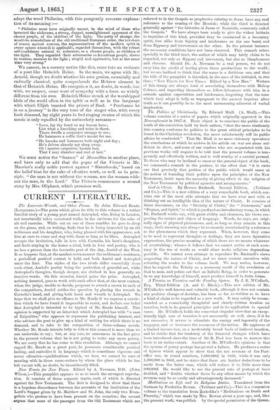M'Culloch's well-known and valuable book, although it does not contain
any positive change of doctrine, has been so far re-written as to have a kind of claim to be regarded as a new work. It may safely be recom-
mended as a remarkably thoughtful and clearly-written treatise on
taxation, both in its general principles and in its application to special cases. Mr. M'Culloch holds the somewhat singular view that an excep- tionally high rate of taxation is not necessarily an evil, since, if it be not excessive, it serves to stimulate the energy and ingenuity of the taxpayer, and so increases the resources of the nation. He approves of
a limited income-tax, on a moderately broad basis of indirect taxation, and he thinks that the tendency of the financial changes which have been introduced since the time of Sir R. Peel has been to narrow this
basis to an undue extent. Another of Mr. M'Culloch's opinions is that
the system of penny postage has proved a failure. He produces a series of figures which appear to show that the net revenue of the Post- office was, in round numbers, 1,600,0001. in 1838, while it was only 1,300,001) in 1861, and he states that there are further deductions to be made from the latter sum, which will reduce it to little more than
800,0001. He would like to see the present rate of postage at least doubled, and " doubts whether there he any other means by which the revenue may be so easily and advantageously increased."






























 Previous page
Previous page